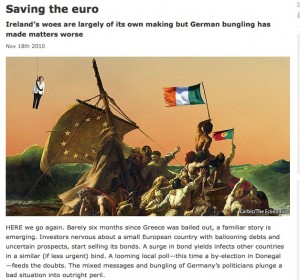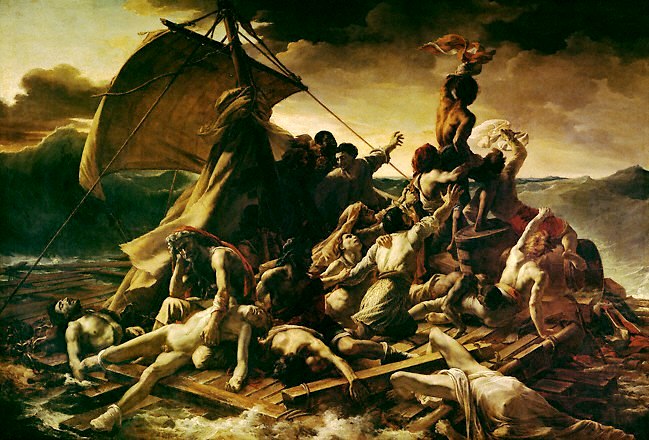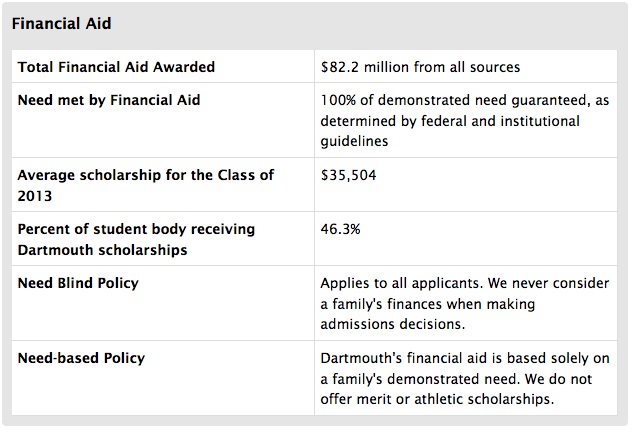Terrific interview which provides a really good explanation of neutrality and how it should apply in the wireless world — and how Google is beginning to think like a Telco. Suddenly made me wonder if Google was more badly burnt by its failure to run a phone shop than we had believed. I’m currently reading Wu’s new book, which is likewise very sobering. Wonderful quote: “The only time that governments do the right thing is when the people are paying attention”.
Category Archives: Politics
The wreck of the Republic
The Economist has a wickedly funny front cover this week. It takes Gericault’s famous picture, The Raft of the Medusa, and Photoshops it to show the wretches on the raft holding Irish and other European flags, and adds, top-left, an RAF rescue helicopter winching in a particularly stolid-looking Angela Merkel to ‘help’.
The imagery becomes even more hilarious when you know the history of the original.
The painting depicts the aftermath of the wreck of the French naval frigate Méduse, which ran aground off the coast of today’s Mauritania on July 5, 1816. According to Wikipedia, at least 147 people
were set adrift on a hurriedly constructed raft; all but 15 died in the 13 days before their rescue, and those who survived endured starvation, dehydration, cannibalism and madness. The event became an international scandal, in part because its cause was widely attributed to the incompetence of the French captain acting under the authority of the recently restored French monarchy.
The references to cannibalism and incompetence are particularly relevant to Fianna Fail, hitherto known as “the political wing of the Irish construction industry”.
LATER: Lorcan Dempsey pointed me at John Banville’s essay in the New York Times:
It is the figures, mainly, that cow us into silence. It is estimated that the banking debt of this nation, which has a population of only 4.6 million, may be substantially more than 100 billion euros. That is 100,000 millions and rising. When we were at school it amused our science teachers to dazzle us with astronomical statistics — so many myriads of light years, so many zillions of stars — but the numbers that we are being forced to count on our too-few fingers now have nothing to do with the fanciful dimensions of outer space. They represent precisely the breadth and depth of the financial hole into which we have toppled headlong.
In the months after September 2008, when the Irish government, after a night-long crisis meeting, was forced to give a guarantee of some 400 billion euros — money we had no hope of ever having — to save the Irish banks from collapse, we used to say that it would fall to our children to pay for our financial folly. Now we know that it will be our children and our children’s children and our children’s children’s children, unto the nth generation, who will bear the burden of our debts, including the “substantial loan” from international lenders that officials now acknowledge is necessary.
There used to be a nice acronym that neatly expressed how the Irish people conceive of themselves: MOPE, that is, Most Oppressed People Ever. For a decade or so, when the Tiger was at its fiercest, we threw off the mantle of oppression, as once we had thrown off what used to be called “the yoke of British rule.” On Wednesday, the British chancellor of the Exchequer, George Osborne, announced in Brussels that his government stood ready to help Ireland in its hour of need. Oh, bitter day.
All the same, life goes on, somehow. We are learning a new resilience. Humbled as we are, we might even begin to learn social responsibility, a quality in which we have been singularly lacking up to now. Who knows, we may at last recognize the irreplaceable value of public and private honesty. But let us not light the firecrackers just yet.
Was it for this?
That’s the headline over an extraordinary Editorial in today’s Irish Times as the paper contemplates the wreckage and humiliation that a corrupt and incompetent Fianna Fail administration has brought on my homeland.
IT MAY seem strange to some that The Irish Times would ask whether this is what the men of 1916 died for: a bailout from the German chancellor with a few shillings of sympathy from the British chancellor on the side. There is the shame of it all. Having obtained our political independence from Britain to be the masters of our own affairs, we have now surrendered our sovereignty to the European Commission, the European Central Bank, and the International Monetary Fund. Their representatives ride into Merrion Street today.
Fianna Fáil has sometimes served Ireland very well, sometimes very badly. Even in its worst times, however, it retained some respect for its underlying commitment that the Irish should control their own destinies. It lists among its primary aims the commitment “to maintain the status of Ireland as a sovereign State”. Its founder, Eamon de Valera, in his inaugural address to his new party in 1926, spoke of “the inalienability of national sovereignty” as being fundamental to its beliefs. The Republican Party’s ideals are in tatters now.
…
Irish history makes the loss of that sense of choice all the more shameful. The desire to be a sovereign people runs like a seam through all the struggles of the last 200 years. “Self-determination” is a phrase that echoes from the United Irishmen to the Belfast Agreement. It continues to have a genuine resonance for most Irish people today.
The true ignominy of our current situation is not that our sovereignty has been taken away from us, it is that we ourselves have squandered it. Let us not seek to assuage our sense of shame in the comforting illusion that powerful nations in Europe are conspiring to become our masters. We are, after all, no great prize for any would-be overlord now. No rational European would willingly take on the task of cleaning up the mess we have made. It is the incompetence of the governments we ourselves elected that has so deeply compromised our capacity to make our own decisions.
They did so, let us recall, from a period when Irish sovereignty had never been stronger. Our national debt was negligible. The mass emigration that had mocked our claims to be a people in control of our own destiny was reversed. A genuine act of national self-determination had occurred in 1998 when both parts of the island voted to accept the Belfast Agreement. The sense of failure and inferiority had been banished, we thought, for good.
To drag this State down from those heights and make it again subject to the decisions of others is an achievement that will not soon be forgiven. It must mark, surely, the ignominious end of a failed administration.
Well, yes. But the problem is that there is no knowing what kind of electoral result will follow from this catastrophe. With a bit of luck, Fianna Fail’s run as a serious political party has finally ended, just as — in the end — Italy’s Christian Democrats imploded. But what then? Most of the Irish political establishment is implicated in the disaster that was the Celtic Tiger. One option is that public fury will erupt at the next election in a Tea Party-type explosion of incoherent activism, and Ireland will wind up with an administration rather like that of the Netherlands, in which a party of enraged, contradictory, xenophobic weirdos hold the balance of power.
And then there is the sinister news that Gerry Adams, sensing an opportunity, has decided to resign his seat in the Northern Ireland Assembly to stand for the Dublin parliament.
LATER: In a discussion on RTE Radio this evening, the former Taoiseach, Garret Fitzgerald, made an ironic point — reminding listeners that the revolutionaries whose insurrection in 1916 eventually led to the founding of the Republic were also hoping for German aid!
Forgetting the rest of the trick
Bill Keegan, the Observer‘s economics commentator, tells a nice story about how the Labour Leader, Michael Foot, lampooned Sir Keith Joseph, Margaret Thatcher’s policy guru, in the early 1980s. Foot, says Keegan, gave
a virtuoso display in a speech which had both sides of the Commons in stitches. He was referring to Sir Keith Joseph, who had played the role of John the Baptist to Thatcher. Foot was speaking when, as now, the Conservatives were conducting a frontal assault on the fabric of British society. He had long tried to recall, said Foot, of whom the right honourable gentleman (Joseph) reminded him. It had suddenly come to him: in his youth, Foot had gone to the Palace Theatre in Plymouth on Saturday nights, where a “magician-conjuror” used to take a gold watch from a member of the audience, wrap it in a red handkerchief, and smash it “to smithereens”. Then, while the audience sat there in suspense, a puzzled look would come over his countenance, and he would say: “I’m very sorry – I’ve forgotten the rest of the trick.” Foot concluded: “That’s the situation of the government.”
Well, I suspect that is also the position of the present government. Thatcher at least had the excuse of fighting double-digit inflation. This government has invented an excuse – namely that the cuts are required to avoid the treatment that the bond markets have been meting out to Greece, Ireland and Portugal.
The Millbank ‘riot’
The thought that came to mind watching coverage of the break-in into Tory HQ was whether the more aggressive ‘protestors’ might not, in fact, have been provocateurs, so convenient was the excuse they provided for synthetic right-wing outrage. I spoke to several people who had been on the demonstration in London, and without exception they described it as a heartening, good-natured, serious mobilisation of public opinion which was clearly about more than just the narrow issue of student fees. But you’d never gather that from a survey of the mainstream media.
This point is nicely articulated by Guy Aitchison in his piece on openDemocracy.net:
Now, clearly there were acts of vandalism that accompanied the occupation of Millbank, but the instinct of the crowd was decisively against violence. When one protester picked up a rock, he was told to stop being an “idiot” and the throwing of the fire extinguisher was greeted by a chorus of booes and a chant of “stop throwing shit”, as this video shows. A 23 year old man from Cambridgeshire has apparently now been arrested over this incident. Good. If it is indeed him who hurled the projectile, he had no support for his actions amongst students at the time, and will have none now.
The occupation of 30 Millbank, on the other hand, certainly did have the support of the crowd. This wasn’t just a minority of hotheads, a rogue gang of “anarchists” and “Trots”, as Caroline Flint put it on Question Time yesterday. These were young, fresh-faced kids of the kind you’d find in any student bar. Disillusioned and enraged by a political elite that has chosen to make their generation pay for a crisis they didn’t cause, they saw an opportunity passing Millbank to get involved in a spontaneous direct action against the poorly guarded Tory HQ. And they took it. The hundreds who occupied the building had the support of the thousands who cheered them on outside, and many more no doubt on TV. Many I spoke to, who got involved in the occupation, were 16 and 17 and had taken the day off school, risking the wrath of their teachers, to protest. As John Harris put it:
“What happened on Wednesday afternoon was not some meaningless rent-a-mob flare-up, nor an easily-ignored howl of indignation from some of society’s more privileged citizens. It was an early sign of people growing anxious and restless, and what a government pledged to such drastic plans should increasingly expect.”
The other important point to recognise is that this wasn’t a purely self-interested protest about fees by a privileged few. The majority of those protesting won’t be affected by the hike in fees, and in any case students were keen to show solidarity with other victims of the coalition’s austerity agenda. The slogans and statement by those on the roof of Millbank make this clear. As Richard Seymour points out, it is patronising and untrue, to imply, as Polly Toynbee does, that only the middle class care about defending university education – many students come from working class families, live in poor quality accommodation and struggle to get by on low paid jobs. The benefit of accessible higher education to the individual and society is recognised across all social classes.
The strange thing about the current period of phoney war is how strangely passive enraged populations are, both here and in Ireland (where the public sector cuts necessitated by the recklessness of bankers and their corrupt political associates are much more savage than anything contemplated by the Con-Dem coalition). But the rage is real, and deep-seated. And it will find an outlet, one way or another. In the US, the rage has taken a particular route — in the Tea Party and the mid-term elections. It hasn’t yet been expressed in Europe, except in France and Greece. All it needs is for the appearance of a skilful, charismatic politician on the scene who is willing to exploit and channel the rage and then we’ll see some interesting developments.
Blair in his own words
My friend Gerard alerted me to this remarkable conversation between Tony Blair and Wouter Bos, a former Dutch Cabinet minister who has now retired from politics. Two things stand out for me: the fact that a decent amount of time (nearly an hour) was allocated for the conversation; and how open and relaxed Blair is. This is, I suspect, a product of several factors: firstly, he is talking to one of his peers — another former senior politician — rather than to a journalist; secondly, the fact that the interview is not taking place in the UK, and is therefore free from the confrontational ethos of British political discourse; and thirdly the fact that Bos is a very thoughtful and insightful interrogator. Worth watching.
The idea of a university: the ConDem version
For Russell Group, read Ivy League.
Here’s the current cost of attending Dartmouth College in New Hampshire, the smallest of the US Ivy League schools.
And here’s the level of support offered by this (very rich) institution:
So if you’re an average student receiving average support, your college bill is $20,220 — or £12,792 in real money.
Which is probably about what Oxbridge will want to charge. Trebles all round in the Bullingdon Club, eh?
Nudge, nudge, wink, wink: markets are ok, really

One of the strangest things about the ConDem coalition is its claim to be pragmatic rather than ideological. In fact, it may turn out to be the most ideological administration we’ve seen since the middle period of Thatcher. Peter Wilby makes the point in a terrific column in today’s Guardian.
If we want a true picture of what Cameron’s government is about, we should look at another recent recruit to the tent: Richard Thaler, a Chicago University academic who is advising a ‘behavioural insight team’. This has been dressed up as another example of Tory de-Thatcherising, enlisting compassionate, interventionist approaches to social problems. Thaler claims to be what Americans call a ‘liberal’. Cass Sunstein, another Chicago man and Thaler’s co-author on a book called Nudge, which caused much excitement when it came out in 2008, works for President Obama. But Thaler is not quite what Cameron wants you to think he is.
Nudge provides Cameron with the academic cover that Anthony Giddens, the sociologist who wrote The Third Way, provided for Blair. It claims to set out ‘the real Third Way’, implying, conveniently for Cameron, that Labour chose a false path. Markets aren’t always right, the authors argue. Because humans don’t always make rational choices, markets sometimes operate inefficiently. From this (to anyone other than a Chicago professor) rather obvious premise, Nudge proceeds to outline a philosophy of “libertarian paternalism”. The state, without direct regulation or more than minimal costs to the advantaged, can gently persuade humans to act in their own and the wider community’s interests.
Wilby points out that this libertarian paternalism bears “the same theological relationship to Friedmanite economics (Milton Friedman was also a Chicago professor) as intelligent design does to creationism. It strips out the demonstrably false aspects of the doctrine and gives it a makeover.”
After the banking crisis, the belief that markets work perfectly was as unsustainable as the belief that God created the world in 4004BC. Nudge comes to the rescue, proposing ways to make markets work better without directly interfering with them, still less penalising those who grow rich from them. It discusses not the merits of privatising social security, but the best way of doing it. It considers why Americans aren’t saving more for their retirement, without mentioning that, for the majority, real wages haven’t risen in a decade. The premise is that if people act against their own best interests – by using drugs, eating junk, failing to save or taking out loans they can’t repay – it is because of their individual behavioural flaws, not because of poverty, inequality or lack of hope.
Nudge, though written before the worst effects of the credit crunch were evident, came at a convenient moment for free-market capitalism. It argues that there’s nothing wrong with markets, only with people, and the state’s role is to make people fit for markets, not the other way about.
Just to underscore the point, the Economist (from whose print cover the image above is taken) recently had a piece arguing that the ConDems are the most radical government in the Western world. ‘Radical’ in this sense means “hell-bent on shrinking the state”. That sounds pretty ideological to me.
Look before you leak
This morning’s Observer column.
In the annals of the net, one of the sacred texts is John Gilmore’s aphorism that “the internet interprets censorship as damage and routes around it”. Mr Gilmore is a celebrated engineer, entrepreneur and libertarian activist, who is regarded by the US Department of Homeland Security, the National Security Agency and men in suits everywhere as a pain in the ass. He was the fifth employee of Sun Microsystems, which meant that he made a lot of money early in life, and he has devoted the rest of his time to spending it on a variety of excellent causes. These include: creating the ‘alt’ (for alternative) hierarchy in the Usenet discussion fora; open-source software; drugs law reform; philanthropy; and the Electronic Frontier Foundation (which last week won a notable concession from the Library of Congress to legalise the “jailbreaking” of one’s iPhone – ie liberating it from Apple’s technical shackles).
The aphorism came up a lot last week following publication by the Guardian, the New York Times and Der Spiegel of extensive reports based on the stash of classified US military reports published on the WikiLeaks website. And of course in one sense this latest publishing coup does appear to confirm Gilmore’s original insight. But at the same time it grossly underestimates the amount of determination and technical ingenuity needed to make sure that the aphorism continues to hold good…
Google and China
Rebecca MacKinnon offers a typically informed and intelligent comment on the Chinese decision to renew Google’s operating licence.
Since Chinese regulators don’t confide in me personally I can only speculate on their motivations. It seems that the pragmatists have prevailed over the ideologues in this case. If Google’s web license were to be denied, Google would be shut out of China completely. That sends a very negative message to the international business community, which is already concerned about China’s politicized business environment. Questions would be raised about barriers to trade. The problem could be taken to the governmental level at a time when the last thing the U.S. and China need is more cause for tension. Now that Google.cn is in technical legal compliance and the uncensored search engine has been taken offshore out of mainland Chinese jurisdiction to Hong Kong where it is perfectly legal, it’s better for Chinese regulators to declare victory and allow Google to pursue business activities in China that do not run afoul of Chinese regulations: R&D, advertising sales, mobile operating platforms, etc.
Yep. It looks to me as though Google judged this one very astutely.




